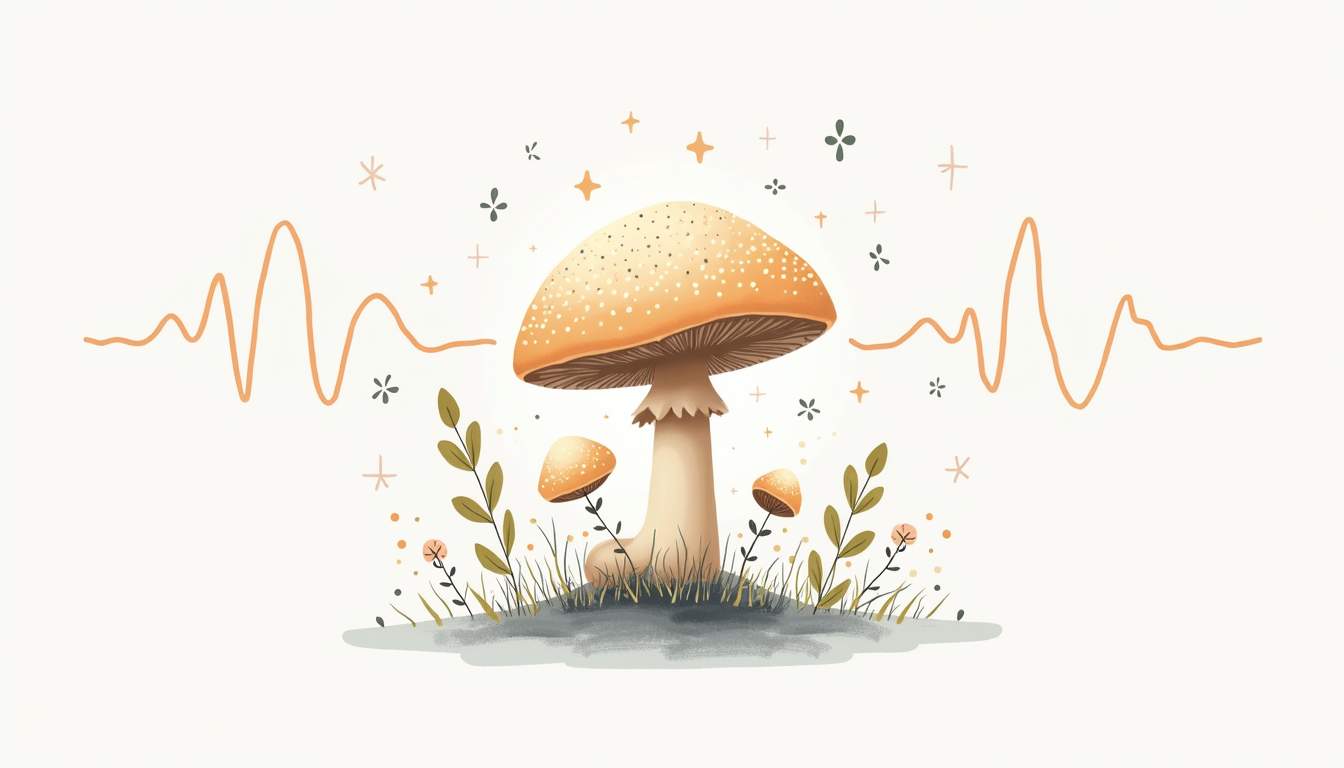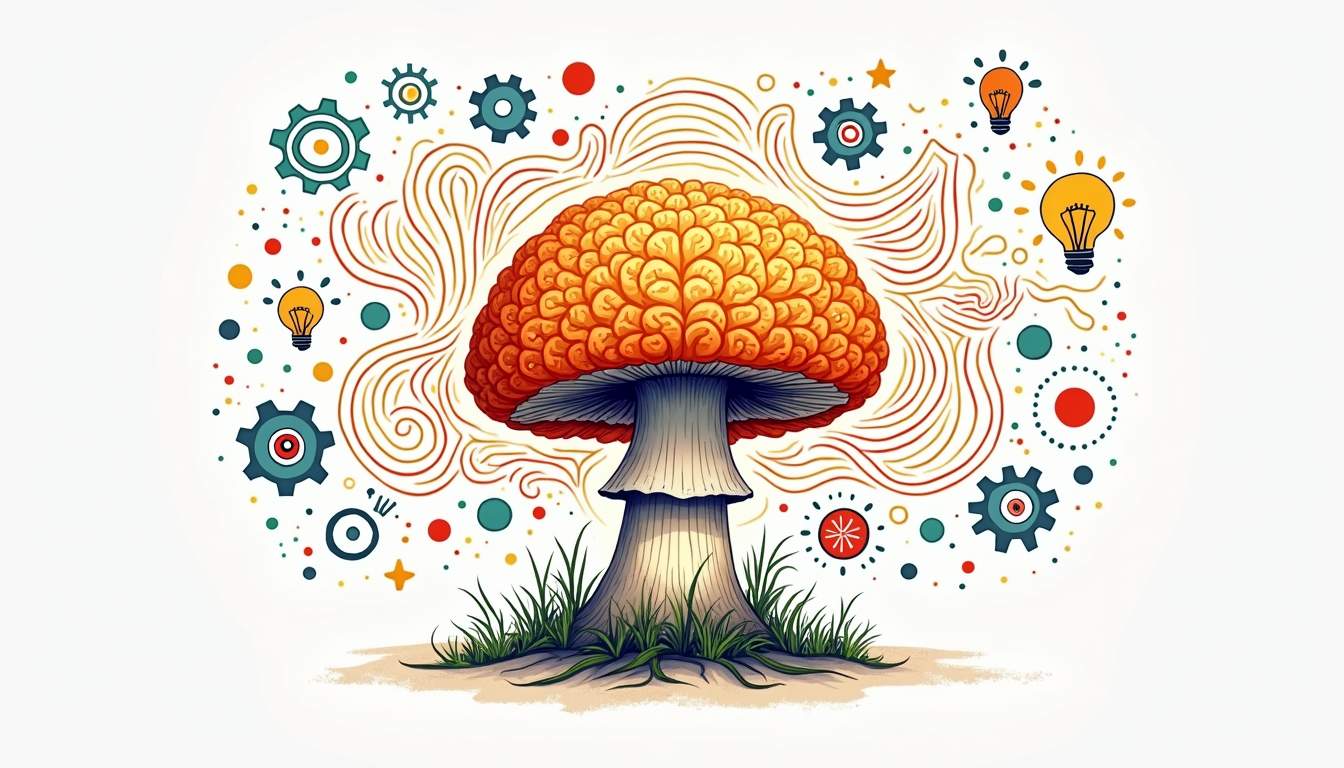Lion's Mane mushroom, scientifically known as Hericium erinaceus, has garnered significant attention in recent years for its potential cognitive benefits. This unique fungus, resembling a lion's mane, has been used in traditional medicine for centuries, particularly in Asian cultures.
With an increasing number of studies exploring its effects on focus and brain fog, many are curious about what the science says regarding its efficacy and safety.
When should you take Lion’s Mane for focus and brain fog?
Lion’s Mane may help improve focus and reduce brain fog by supporting nerve growth and reducing inflammation. Most people take 500–1,000 mg daily for cognitive support. Effects are usually noticed after a few weeks of consistent use.
Understanding Lion's Mane Mushroom
What is Lion's Mane and Its Traditional Uses
Lion's Mane mushroom is a distinctive, white, shaggy fungus that grows on hardwood trees. It has been used in traditional Chinese medicine for its purported health benefits, particularly for enhancing cognitive function and promoting overall brain health. Historically, it was consumed as a food source and utilized in herbal remedies aimed at improving memory and concentration.
In addition to its cognitive benefits, Lion's Mane has also been associated with digestive health and immune system support. Its rich nutritional profile includes antioxidants, vitamins, and minerals, making it a valuable addition to a balanced diet.
The mushroom's unique appearance and culinary versatility have made it a popular ingredient in various dishes, from soups to stir-fries. In fact, many chefs appreciate its delicate flavor and meaty texture, often incorporating it into gourmet recipes that highlight its unique qualities.
Beyond the kitchen, Lion's Mane has gained traction in modern wellness circles, with many enthusiasts advocating for its use in supplements and extracts to harness its potential health benefits.
Active Compounds and Their Mechanisms
The therapeutic effects of Lion's Mane are attributed to several bioactive compounds, including hericenones and erinacines. These compounds are believed to stimulate the production of nerve growth factor (NGF), a protein essential for the growth, maintenance, and survival of neurons.
By promoting NGF synthesis, Lion's Mane may support neurogenesis—the process of forming new neurons—which is crucial for maintaining cognitive function.
Additionally, Lion's Mane is rich in antioxidants, which help combat oxidative stress in the brain. Oxidative stress is linked to neurodegenerative diseases and cognitive decline. By reducing oxidative damage, Lion's Mane may contribute to improved brain health and cognitive performance.
Recent studies have also suggested that Lion's Mane may have anti-inflammatory properties, which could further protect the brain from damage caused by chronic inflammation. This dual action of reducing inflammation while promoting nerve growth makes Lion's Mane a compelling subject for ongoing research, as scientists explore its potential applications in treating conditions such as Alzheimer's disease and other forms of dementia.
Furthermore, the mushroom's ability to enhance mood and reduce anxiety has garnered attention, offering a holistic approach to mental wellness that aligns with the growing interest in natural remedies and functional foods.
What Research Says About Lion’s Mane and Mental Performance
Research on Focus Enhancement and Concentration
Several studies have investigated the effects of Lion's Mane on cognitive function, particularly regarding focus and concentration. One notable study published in the journal "Phytotherapy Research" found that participants who consumed Lion's Mane extract experienced significant improvements in cognitive performance compared to a placebo group.
These improvements were particularly evident in tasks requiring sustained attention and focus.

Another study involving older adults with mild cognitive impairment showed that Lion's Mane supplementation led to enhanced cognitive function after 16 weeks of consistent use. Participants reported improved focus and mental clarity, suggesting that Lion's Mane may be beneficial for those experiencing age-related cognitive decline.
The mechanism behind these improvements may be linked to the presence of hericenones and erinacines, compounds found in Lion's Mane that are believed to stimulate the production of nerve growth factor (NGF), which plays a crucial role in the survival and maintenance of neurons.
In addition to these findings, recent research has also begun to explore the potential of Lion's Mane in enhancing cognitive flexibility—the ability to adapt one's thinking to new and unexpected conditions.
A study conducted on younger adults indicated that those who supplemented with Lion's Mane showed marked improvements in tasks that required rapid shifts in attention and strategy. This suggests that Lion's Mane could be a valuable ally not only for those seeking to improve focus but also for individuals looking to enhance their overall cognitive agility.
Studies on Brain Fog Reduction and Mental Clarity
Brain fog, characterized by confusion, forgetfulness, and a lack of mental clarity, can significantly impact daily life. Research indicates that Lion's Mane may help alleviate these symptoms.
A study published in "Biomedical Research" explored the effects of Lion's Mane on cognitive function in individuals with mild cognitive impairment. The results demonstrated that participants experienced a reduction in brain fog and an improvement in overall mental clarity after consuming Lion's Mane extract.
Furthermore, another study highlighted the potential of Lion's Mane in reducing anxiety and depression, both of which can contribute to feelings of brain fog. By addressing these underlying issues, Lion's Mane may indirectly enhance cognitive function and clarity, providing a holistic approach to mental wellness.
The anti-inflammatory properties of Lion's Mane are also worth noting, as chronic inflammation has been linked to cognitive decline and mood disorders. By mitigating inflammation, Lion's Mane may not only support mental clarity but also promote a healthier brain environment.
Moreover, anecdotal evidence from users of Lion's Mane supplements often highlights an increase in creativity and problem-solving abilities, suggesting that the benefits of this mushroom extend beyond mere cognitive enhancement. Many users report feeling more inspired and capable of tackling complex tasks, which can be particularly beneficial in creative fields or high-pressure environments.
This multifaceted impact on mental function underscores the potential of Lion's Mane as a natural cognitive enhancer, appealing to a wide range of individuals seeking to optimize their mental performance.
Practical Applications and Considerations
Dosage Guidelines and Supplement Forms
When considering Lion's Mane for cognitive enhancement, it's essential to understand the appropriate dosage and forms available. Lion's Mane is commonly available in various forms, including capsules, powders, and tinctures. The recommended dosage can vary depending on the form and concentration of the supplement.
For powdered forms, a typical dosage ranges from 1 to 3 grams per day, while capsules often contain around 500 mg to 1,000 mg per serving. It's advisable to start with a lower dose and gradually increase it based on individual tolerance and desired effects. Consulting with a healthcare professional before starting any new supplement regimen is always recommended, especially for those with pre-existing health conditions or those taking medications.
Additionally, some users prefer to incorporate Lion's Mane powder into their daily smoothies or coffee, allowing for a versatile approach to supplementation that can enhance both flavor and cognitive function.
Potential Side Effects and Drug Interactions
While Lion's Mane is generally considered safe for most individuals, some may experience mild side effects, including digestive discomfort, allergic reactions, or skin rashes. It is crucial to monitor any adverse reactions, especially when beginning supplementation.
Moreover, Lion's Mane may interact with certain medications, particularly those affecting blood sugar levels or anticoagulants. Individuals taking such medications should exercise caution and consult with a healthcare provider before incorporating Lion's Mane into their routine. Understanding potential interactions is vital for ensuring safety and efficacy. Furthermore, it’s worth noting that while Lion's Mane is well-tolerated by many, the effects can vary significantly from person to person.
Some users report enhanced focus and mental clarity, while others may not experience noticeable changes. Keeping a journal of your experiences can help track the effects and adjust dosages accordingly, ensuring a personalized approach to cognitive enhancement.
Conclusion
As research continues to unveil the cognitive benefits of Lion's Mane mushroom, it becomes increasingly evident that this unique fungus holds promise for enhancing focus and reducing brain fog.
With its rich history in traditional medicine and growing scientific support, Lion's Mane may serve as a valuable tool for those seeking to improve their cognitive function and overall mental clarity. However, it is essential to approach supplementation thoughtfully, considering dosage, potential side effects, and individual health circumstances.

Incorporating Lion's Mane into a balanced lifestyle, alongside a healthy diet and regular exercise, may contribute to optimal brain health. As always, staying informed and consulting with healthcare professionals can help individuals make the best choices for their cognitive well-being.
Improve Focus Naturally with Lion’s Mane
Ready to try a natural way to support your brain health? Our Lion’s Mane Mushroom Capsules are third-party tested, vegan-friendly, and designed to support mental clarity and focus—without the crash.
-
500 mg high-strength extract per capsule
-
Supports memory, focus, and cognitive clarity
-
Easy to take daily for long-term benefits

Share:
Morning or Night? Best Time to Take Ashwagandha for Stress & Anxiety Relief
Hydrolyzed vs Non-Hydrolyzed Collagen: Which Is Better for Skin, Absorption, and Results?